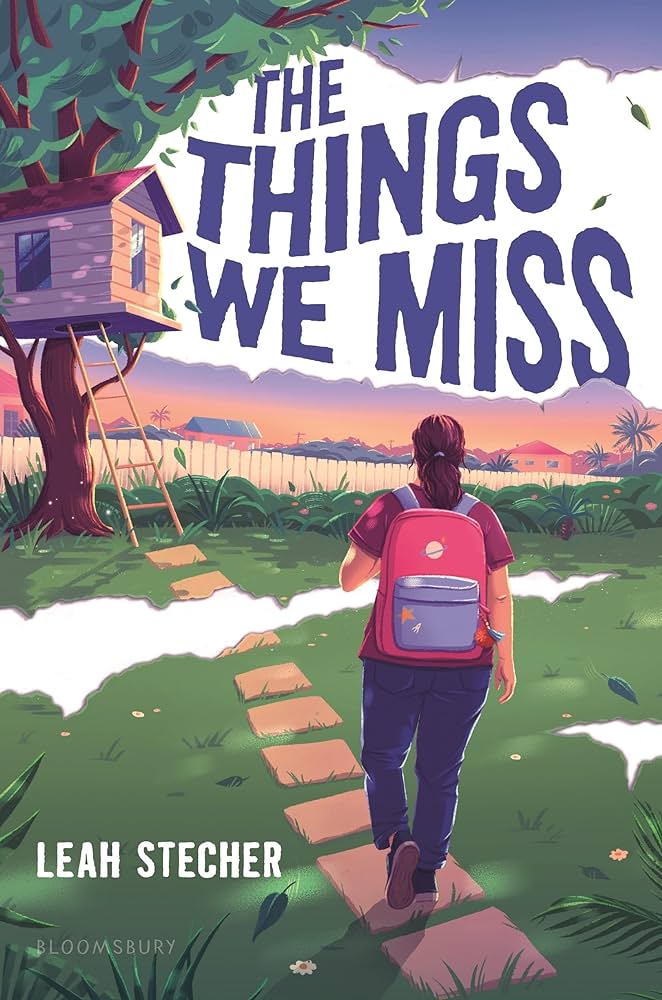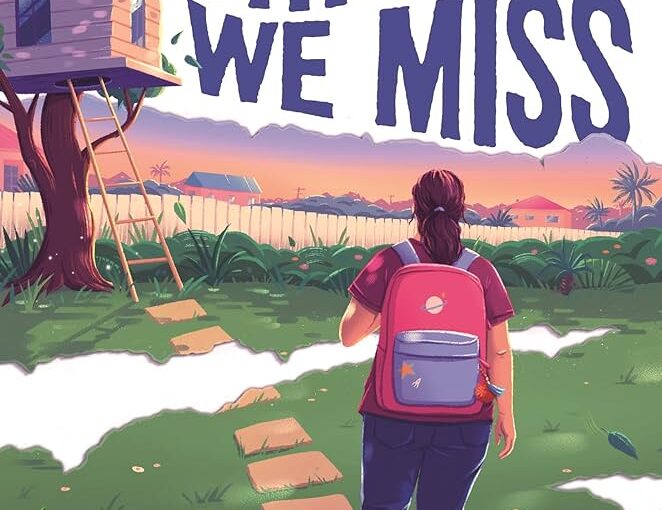There’s a new type of reluctant reader that I put my finger on, and I’m one of them- the dramatic reluctant reader. In the venn diagram of readers, this person crosses over into the realistic fiction persona with ease, but our new moniker avoids books that are overly dramatic. The Things We Miss is mglit that were it not for the inclusion of a tree house that’s developed a time porthole would’ve easily fallen into that category. The odds on it being read by even someone who loves to read, but doesn’t like drama would’ve shrunk at a more precipitous rate than the box office for recent Marvel films. However, include a time porthole, put it in a tree house and include all the middle school angst you can handle and you’ve got a winner.

This is a very delicate balance. A porthole in a tree house is kind of silly and could put off those mglit readers who want more realism in their books. Mglit audiences want to read about kids going through things that they’re experiencing, but they also don’t mind a little levity. Science-fiction audiences enjoy the thrill of their minds wondering what would happen, as well as, putting themselves into situations where they don’t know what’s happening with alien civilizations. Thus, it’s fitting that J.P is going into seventh grade, a time in her life where she’s able to experience all that by the time the bell rings for second period.
It’s not only that, in The Things We Miss readers quickly discover that J.P. is overweight, her grandfather has cancer, her father has died, and she overslept the morning of his funeral. This is a old-school country song waiting to be written. Thankfully, it’s not all Debbie downer, we fast forward two years when things have changed, she’s going into seventh grade, is still overweight, and her grandfather’s cancer has returned. She does have a good friend, Kevin, with whom they share a bond over a popular science-fiction show that’s about to be made into a feature-length movie.
After one particularly trying day at school, J.P. comes home frustrated and needs a place to calm down, so she goes into her old tree house. It’s technically her neighbor’s, but she’s always used it since before her father died it was one of those days. When she enters the tree house she sees a painted door on the wall. When her hand touches the door knob it turns into a 3D object and she’s able to open it. As she looks through the door she wonders about the safety of it all, where it could go, does she need a return key to open it, and other things, but she’s in seventh grade, so she steps on through.
There are some fun twists in The Things We Miss that I won’t spoil here. Most importantly it’s a short-term, three-day trip to the future where she comes back already having experienced the things during that 72-hour period. This allows her the comfort to bypass potentially troublesome things that she may want to avoid, like tests, confrontations or parties where she’ll be embarrassed. J.P. shares the discovery of the door with Kevin, who embarks on the jump and enjoys it, but not nearly as much as she does.
When someone jumps through the door, they don’t remember what they did, how they acted or specific things that they said during that three-day period. Most of the times the stories that they hear about how they were in those instances is how our mind’s eye imagines we’d all be in those situations. We dance better, have quicker comebacks, do better on the tests and operate with grade under pressure, unlike normal life.
It’s a tempting way to think and live isn’t it? However, when they jump life around them keeps happening, and if they don’t remember it then the problems start to add up. If you don’t remember to meet your friend someplace then that friendship will weaken. People around you might get sick, and then you emerge from the jump as if nothing is wrong and people rightfully come down on you for forgetting things or being insensitive.
The science-fiction angle to The Things We Miss is introduced early and effectively in the book. Once it’s introduced, the time travel aspect takes a back seat and the vast majority of the book happens in real life, with the characters looking at the person who just jumped as someone who’s acting weird. But, they’re not the weird one, they’ve just jumped ahead three days and were able to seamlessly ace that test or do that cool thing. Those around them don’t see it that way, they become blank shells of a person that needs the ‘jump’ experience in order to become their true self.
There are lots of metaphors that readers could put into place here. In the end though, it’s a story about friendship and being a good friend. You don’t have to be the best, super-friend in the world, just care about what they’re going through, offer up the simply things that might help them out and be there.
In The Things We Miss, see….the book’s title makes sense once you get the bigger picture about its plot; you might come for the science-fiction and the time travel, but in reality that’s 5% of the story. If that’s the case, then come on in and get past that dramatic reluctant reader bug that’s been ailing you. Oh, you’re coming in because you’re in the drama camp, like some mglit and are curious about approachable time travel that’s blended in with your real-life middle school yarn? You’ll be fine with this book too.
The Things We Miss is by Leah Stecher and is available on Bloomsbury Children’s Books.
There are affiliate links in this post.





 Facebook
Facebook Twitter
Twitter Flickr
Flickr GooglePlus
GooglePlus Youtube
Youtube